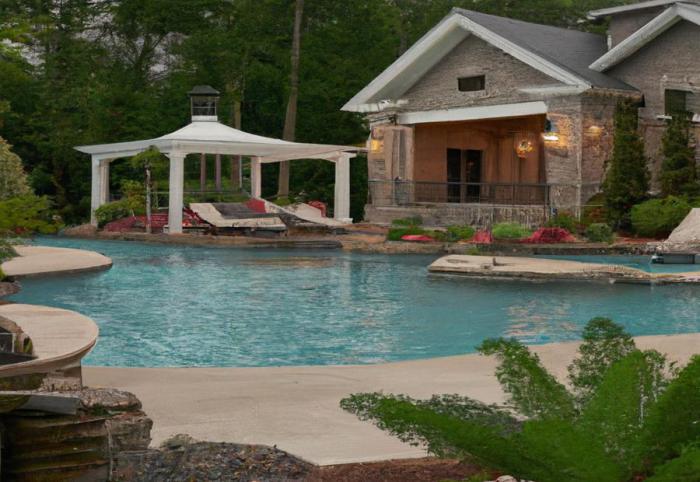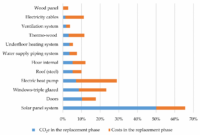Finding reputable swimming pool contractors with good reviews is crucial for a successful project. Building a pool is a significant investment, both financially and emotionally, so choosing the right contractor is paramount. This guide will walk you through the process of finding a reliable professional, ensuring your dream pool becomes a reality without unnecessary stress or costly mistakes.
We’ll cover everything from online research and review analysis to verifying credentials and comparing proposals, ultimately empowering you to make an informed decision.
The process of selecting a contractor involves careful consideration of various factors. It’s not just about the lowest price; it’s about finding a company with a proven track record of quality workmanship, excellent communication, and a commitment to customer satisfaction. This guide will equip you with the tools and knowledge needed to navigate this important decision, ensuring a positive and rewarding experience.
Identifying Reputable Contractors
Finding a trustworthy swimming pool contractor is crucial for a successful project. A poorly executed pool installation can lead to costly repairs, safety hazards, and significant headaches. Thorough research is essential to avoid these problems. This section Artikels key steps to help you identify reputable contractors.
Several online resources can help you find verified swimming pool contractor profiles. These platforms often include reviews, ratings, and contact information, allowing you to compare different companies and make informed decisions.
Online Resources for Finding Verified Contractor Profiles
Many websites specialize in connecting homeowners with qualified contractors. These platforms often have verification processes to ensure the listed contractors meet certain standards. Checking multiple resources can provide a more comprehensive picture of a contractor’s reputation.
- Your Local Better Business Bureau (BBB): The BBB offers ratings and reviews for businesses, including contractors. They may also list complaints and how the businesses addressed them.
- Angie’s List: A subscription-based service, Angie’s List provides verified reviews and ratings for various home service professionals, including pool contractors.
- HomeAdvisor: HomeAdvisor is a large online platform that connects homeowners with pre-screened contractors. They offer a range of services and resources.
- Google My Business: Many pool contractors have Google My Business profiles, where customers can leave reviews and ratings. This is a readily accessible resource.
- Yelp: Yelp is a popular review site where users can leave reviews for businesses in their area. You can find reviews for pool contractors here.
Licensing and Insurance Verification
Checking a contractor’s licensing and insurance is vital to protect yourself from potential problems. Unlicensed or uninsured contractors may not be held accountable for shoddy work or accidents on your property.
Licensing ensures the contractor has met specific requirements and possesses the necessary expertise. Insurance, including general liability and workers’ compensation, protects you from financial liability if something goes wrong during the project. You should always request proof of both before hiring a contractor.
Red Flags to Watch Out for When Researching Contractors Online
While online reviews can be helpful, it’s important to be aware of potential red flags that may indicate a less-than-reputable contractor.
- Lack of online presence or inconsistent information across different platforms: A contractor with little to no online presence or conflicting information about their experience or licensing should raise concerns.
- Overly positive reviews without any negative feedback: This could suggest fabricated reviews or a lack of transparency. Look for a mix of positive and negative feedback; this is often more realistic.
- Vague or missing details about their services and processes: A reputable contractor will provide clear information about their services, pricing, and timelines.
- High-pressure sales tactics or unwillingness to answer questions: A contractor who pressures you into a decision or avoids answering your questions should be approached with caution.
- Negative reviews mentioning unfinished work, disputes, or poor communication: Pay close attention to the nature of negative reviews; recurring themes suggest potential problems.
Comparison of Online Review Platforms
Different online review platforms have varying features and levels of reliability. Comparing these features can help you choose the most suitable resources for your research.
| Platform | Verification Process | Review Quality | Ease of Use |
|---|---|---|---|
| Yelp | Limited verification; relies on user reports | Variable; can include both helpful and unhelpful reviews | High; user-friendly interface |
| Google Reviews | Moderate verification; Google may remove fake reviews | Generally reliable; often includes photos and details | High; integrated with Google Maps |
| Angie’s List | Strong verification process; members are screened | High; reviews are typically detailed and well-written | Moderate; requires a subscription |
| BBB | Strong verification process; complaints are investigated | Reliable; focuses on business practices and complaints | Moderate; may require searching by location |
Analyzing Online Reviews
Online reviews are a crucial tool for vetting potential swimming pool contractors. Don’t just skim the surface; a thorough analysis of both positive and negative feedback provides a balanced picture of a contractor’s reliability and professionalism. By carefully examining the details, you can separate genuine experiences from potentially misleading ones.Reading both positive and negative reviews offers a more realistic perspective than focusing solely on glowing testimonials.
Positive reviews can highlight strengths, while negative reviews often reveal crucial weaknesses or potential red flags. A contractor with overwhelmingly positive reviews might be hiding problems, while a contractor with a few negative reviews, addressed professionally, might demonstrate accountability and customer care.
Identifying Fake or Biased Reviews
Spotting fake or biased reviews requires a critical eye. Look for reviews that lack specific details, use generic language, or contain an unusual number of superlatives. Pay close attention to the review’s writing style; inconsistencies with other reviews from the same user or an overly promotional tone might indicate fabrication. Additionally, be wary of a sudden influx of positive reviews, particularly after a period of negative feedback.
This could suggest an attempt to artificially inflate the company’s rating.
Key Aspects to Consider When Analyzing a Review
A checklist can help streamline your review analysis. Consider the following:
- Specificity of Details: Genuine reviews often include specific details about the project, timeline, and materials used. Vague or generalized comments should raise suspicion.
- Timeline Consistency: Check if the review’s timeline aligns with the contractor’s claimed project completion dates or other public information.
- Professionalism of Response: How did the contractor respond to negative feedback? A professional response demonstrating a willingness to address concerns is a positive sign.
- Consistency Across Platforms: Compare reviews across multiple platforms (Google, Yelp, Facebook, etc.). Discrepancies might suggest manipulation.
- Use of Multiple Accounts: Be aware of potential instances of a single user posting multiple reviews under different accounts.
Questions to Ask Yourself While Reviewing Customer Feedback
Before making a decision, ask yourself these crucial questions:
- Do the positive reviews mention specific details that align with my project needs? Generic praise is less informative than detailed accounts of successful projects.
- Are the negative reviews addressed professionally and constructively by the contractor? A lack of response or a dismissive attitude is a significant red flag.
- Do the reviews mention any recurring issues or common complaints? This can highlight potential systemic problems within the company.
- Do the reviews seem authentic and believable? Look for inconsistencies in writing style, excessive praise, or overly negative comments that lack specific details.
- Is there a pattern of reviews from a similar source, suggesting coordinated efforts to inflate or deflate ratings? This can indicate a biased or fraudulent review campaign.
Verifying Contractor Credentials

Source: build-wire.com
Finding a reputable pool contractor involves more than just checking online reviews. Thorough verification of their credentials is crucial to ensure you’re hiring a qualified and trustworthy professional who will deliver quality work and protect you from potential problems. This includes checking their licensing, insurance, experience, and references.
Licensing and Insurance Verification
Confirming a contractor’s license and insurance is a straightforward process, typically involving a visit to your state’s or local government’s licensing board website. These websites usually have search functions allowing you to input the contractor’s name or business name to verify their license status, expiration date, and any disciplinary actions taken against them. Similarly, you can often verify their insurance coverage, specifically their general liability and workers’ compensation insurance.
This ensures they are legally operating and financially responsible for any accidents or damages that might occur during the project. Lack of proper licensing and insurance could leave you liable for accidents or shoddy workmanship. For example, the California Contractors State License Board website (cslb.ca.gov) provides a public database for verifying contractor licenses.
Contractor Experience and Expertise
Asking specific questions about a contractor’s experience and expertise is essential. Instead of general inquiries, focus on relevant projects. For example, you could inquire about the number of similar pool projects they’ve completed, their experience with specific pool types (e.g., fiberglass, concrete, in-ground), and their familiarity with local building codes and regulations. It’s also beneficial to ask about their problem-solving skills and how they’ve handled unexpected issues on past projects.
A contractor’s detailed responses demonstrate their competence and preparedness.
Checking References from Previous Clients
Contacting previous clients to gather feedback on a contractor’s work is vital. Request at least three references and contact them directly via phone. This allows you to get a more candid and detailed assessment than a written testimonial might provide. Be prepared to ask questions about the contractor’s communication skills, adherence to timelines, quality of work, and how they handled any problems that arose during the project.
Sample Phone Call Script for Reference Check
Here’s a sample script you can adapt for your calls:
“Hello, my name is [Your Name], and I’m considering hiring [Contractor’s Name] for a pool project. I understand you worked with them previously. I’d appreciate it if you could share your experience with their work, including their communication, timeliness, quality of work, and how they handled any challenges during the project. Your feedback is greatly valued.”
Following this opening, you can tailor your questions based on the specific aspects of the project you are most concerned about. Remember to be polite, respectful, and concise.
Comparing Contractor Proposals
Choosing the right pool contractor often comes down to carefully comparing their proposals. A side-by-side comparison allows you to objectively assess the value each contractor offers, ensuring you make an informed decision that aligns with your budget and expectations. Don’t just focus on the bottom line; consider the entire package.A well-structured comparison will highlight key differences and similarities, making it easier to identify the best fit for your project.
This process involves more than just looking at numbers; it’s about understanding the implications of each element within the proposal.
Proposal Comparison Table
Creating a comparison table is highly recommended. This allows for a clear and concise overview of each contractor’s offer. Below is an example table you can adapt to your specific needs. Remember to adjust the columns and rows as necessary to include all relevant information from your proposals.
| Contractor | Total Price | Materials | Timeline (Completion Date) | Warranty |
|---|---|---|---|---|
| ABC Pools | $50,000 | Fiberglass shell, standard tile, basic pump and filter | 6 months | 1 year on workmanship, 2 years on equipment |
| XYZ Pools | $55,000 | Concrete shell, upgraded tile, energy-efficient pump and filter | 8 months | 2 years on workmanship, 5 years on equipment |
| 123 Pools | $48,000 | Vinyl liner, standard tile, basic pump and filter | 5 months | 1 year on workmanship, 1 year on equipment |
Key Elements to Compare
Several critical aspects should be considered when comparing proposals. Ignoring even one could lead to unforeseen problems and added costs later.
- Pricing: Don’t solely focus on the lowest price. Consider the value proposition. A slightly higher price might reflect superior materials or a more comprehensive warranty.
- Materials: Carefully review the specifications of the proposed materials. Understand the differences between various options (e.g., types of pool finishes, pump and filter systems). Higher-quality materials often translate to longer lifespan and reduced maintenance costs.
- Timeline: Realistic timelines are crucial. Consider potential delays and how they might impact your project. Be wary of proposals with unrealistically short timelines.
- Warranty: A robust warranty protects you against potential defects in workmanship or materials. Compare the length and scope of warranties offered by different contractors.
- Payment Schedule: Understand the payment terms and milestones. Ensure the payment schedule aligns with the project progress and protects your interests.
Understanding Contract Terms and Conditions
The contract is a legally binding agreement. Carefully review every clause before signing. Ignoring critical terms could have significant legal and financial repercussions. Consult with a legal professional if necessary.
Essential Contract Clauses
Several essential clauses should be included in your swimming pool construction contract to protect your interests.
- Detailed Scope of Work: A precise description of all work to be performed, including materials and specifications.
- Payment Schedule and Terms: Clearly outlining payment amounts, due dates, and conditions for payment release.
- Project Timeline and Completion Date: A realistic completion date with provisions for potential delays and associated penalties.
- Warranty Provisions: Specific details regarding the length, scope, and limitations of the warranty.
- Dispute Resolution: A mechanism for resolving disagreements or disputes that may arise during the project.
- Permits and Inspections: Clarification of responsibilities regarding obtaining necessary permits and inspections.
- Change Orders: A process for managing and approving any changes to the original scope of work.
Visualizing the Project: Finding Reputable Swimming Pool Contractors With Good Reviews

Source: spssunpools.com
Before you sign on the dotted line, a clear vision of your dream pool is crucial. This involves more than just picking a color; it’s about understanding the entire process from design to completion. Working closely with your contractor to visualize the project will ensure the final product matches your expectations and budget.Getting detailed plans and renderings from potential contractors is key to this visualization process.
These visuals provide a concrete representation of the proposed pool and surrounding landscape, allowing you to identify any potential issues or areas for improvement early on. This collaborative process minimizes costly changes or unexpected surprises down the line.
Requesting Project Plans and Renderings, Finding reputable swimming pool contractors with good reviews
To obtain comprehensive project plans, you should explicitly request detailed blueprints, 3D renderings, and any relevant construction schematics. These should clearly illustrate the pool’s dimensions, depth variations, placement of features (such as jets, lights, and waterfalls), and the integration with the surrounding landscaping. A well-prepared contractor will readily provide these documents as part of their proposal. The more detailed the plans, the better you can assess the feasibility and overall aesthetic appeal of the project.
Clarifying Design and Construction Details
Asking specific questions ensures a shared understanding of the project. Instead of simply asking “What materials will you use?”, you should inquire about the specific type and source of materials, their durability, and maintenance requirements. For example, you could ask: “Will you be using a specific type of concrete, and if so, what are its strength and longevity ratings?”.
Similar precision should be applied when discussing the construction timeline, payment schedule, and any potential challenges or contingencies. Thorough questioning demonstrates your commitment to the project and ensures the contractor is equally invested in its success.
Considering Pool Size, Materials, and Landscaping
The size of your pool directly impacts the overall cost and functionality. A smaller pool requires less maintenance and initial investment, while a larger pool offers more swimming space. The choice of materials—concrete, fiberglass, or vinyl liner—significantly affects both the aesthetic and the long-term maintenance. Concrete offers the greatest design flexibility but demands more upkeep. Fiberglass pools are pre-fabricated and require less maintenance but offer less customization.
Vinyl liner pools are cost-effective but have a shorter lifespan. Landscaping plays a crucial role in the overall aesthetic and functionality of the pool area, influencing factors like sun exposure, privacy, and accessibility. Careful consideration of these interconnected factors is paramount.
An Ideal Pool Project: A Descriptive Example
Imagine a freeform, saltwater pool, approximately 16ft x 32ft, with a gradual slope from a shallow wading area to a deep end of 8 feet. The pool is constructed of high-quality concrete, finished with a smooth, light grey plaster. The surrounding area features a spacious sun deck made of natural stone, complemented by lush landscaping that includes drought-tolerant plants and strategically placed palm trees for shade.
Integrated lighting creates a mesmerizing ambiance at night. A cascading waterfall feature adds both visual appeal and the soothing sound of running water. The overall aesthetic is modern and minimalist, emphasizing clean lines and natural materials. The project integrates sustainable features like energy-efficient pool pumps and water-saving irrigation systems.
Assessing Contractor Communication
Clear and consistent communication is crucial for a smooth pool construction project. A contractor’s communication style reflects their professionalism and ability to manage the project effectively. Open communication minimizes misunderstandings, delays, and ultimately, ensures the final product meets your expectations. Poor communication, on the other hand, can lead to frustration, cost overruns, and a disappointing experience.A contractor’s communication style encompasses their responsiveness, clarity, and proactive engagement throughout the project’s lifecycle.
This includes prompt responses to inquiries, clear explanations of project details and potential challenges, and proactive updates on progress. Conversely, a lack of responsiveness, unclear or confusing information, and a failure to provide timely updates can significantly hinder the project.
Examples of Positive and Negative Communication Styles
Positive communication involves proactive updates, readily available contact information, and clear, concise explanations. For instance, a contractor might send weekly email updates with photos of progress, promptly return phone calls within 24 hours, and hold regular in-person meetings to discuss the project’s status and address any concerns. They would also clearly explain any unexpected delays or cost increases, providing detailed justifications.
In contrast, negative communication might involve infrequent, delayed responses to inquiries, vague or unclear explanations, and a lack of proactive updates. Imagine a contractor who only communicates when problems arise, provides little detail about the issues, and doesn’t respond to calls or emails promptly. This lack of transparency can cause significant stress and uncertainty for the homeowner.
Questions to Assess Contractor Communication
It’s important to directly assess a contractor’s communication practices before committing to a project. The following statements represent key aspects to consider: The contractor Artikels their preferred communication methods (email, phone, text) and their typical response times. The contractor describes their process for providing project updates and addressing concerns. The contractor explains how they handle unexpected delays or changes in the project scope.
The contractor details their process for resolving disputes or disagreements. The contractor clearly explains their communication protocols with subcontractors and suppliers.
Sample Communication Plan for Pool Construction
A well-defined communication plan is essential. This plan should include:
- Initial Consultation: In-person meeting to discuss project scope, timelines, and budget. Communication method: In-person meeting.
- Design Phase: Regular updates on design progress and revisions. Communication method: Email and phone calls.
- Permitting Phase: Updates on permit application status and any required revisions. Communication method: Email.
- Construction Phase: Weekly progress reports with photos and videos. Communication method: Email and scheduled in-person site visits.
- Completion Phase: Final walkthrough and explanation of pool maintenance. Communication method: In-person meeting and written instructions.
- Post-Construction: Follow-up communication to address any concerns or issues. Communication method: Email and phone calls.
This plan provides a framework for consistent communication throughout the project, ensuring transparency and minimizing misunderstandings. The specific methods and frequency of communication can be adjusted based on the project’s complexity and the client’s preferences. However, the key is consistency and responsiveness.
Final Thoughts
Building your dream pool should be an exciting journey, not a stressful one. By diligently following the steps Artikeld in this guide – from thoroughly researching contractors and analyzing reviews to verifying credentials and comparing proposals – you can significantly increase your chances of finding a reputable and skilled professional. Remember, thorough preparation and due diligence are key to a successful pool construction project, leading to years of enjoyment and relaxation in your beautiful new backyard oasis.
Don’t rush the process; take your time and make an informed decision that you’ll be happy with for years to come.
Key Questions Answered
How long should I expect the pool construction process to take?
Construction timelines vary depending on the pool’s size, complexity, and weather conditions. Expect a timeframe ranging from several months to a year or more.
What should I do if I have a dispute with my contractor?
Attempt to resolve the issue amicably through direct communication. If that fails, consider mediation or legal action, depending on the severity of the dispute and your contract terms.
What is a reasonable down payment for a pool construction project?
A typical down payment ranges from 10% to 30% of the total project cost. Be wary of contractors requesting significantly higher upfront payments.
Can I finance the cost of my pool?
Yes, many lenders offer financing options specifically for home improvement projects like pool construction. Shop around for the best rates and terms.
How often should I expect updates from my contractor during the project?
Regular updates, ideally weekly or bi-weekly, are essential. Establish a clear communication plan with your contractor at the beginning of the project.



